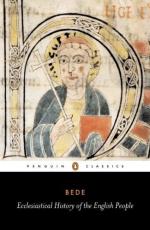|
This section contains 5,755 words (approx. 20 pages at 300 words per page) |

|
SOURCE: Charles W. Jones, "Bede as Early Medieval Historian," in Bede, the Schools and the Computus, edited by Wesley M. Stevens, Variorum, 1994, pp. 2636.
In the following excerpt originally published in 1946, Jones provides background and argues that Bede's historiography, which links chronography with hagiography, was typical of historians of his time.
Although many believe, considering his archetypal position in English thought and letters, that Bede's contributions to medieval and modern thought have been unduly neglected, his historiography has been scrutinized by two outstanding scholars, Charles Plummer1 and Wilhelm Levison.2 I shall not attempt to reproduce the picture they have painted. Rather, I want to generalize their detail by marking structural lines, showing how Bede, exceptional though he was, typifies the historiography of his age. In doing so, I shall pay particular attention to three literary forms of the period, calendar, saint's life, and chronicle—indicating their unity in trinity...
|
This section contains 5,755 words (approx. 20 pages at 300 words per page) |

|


